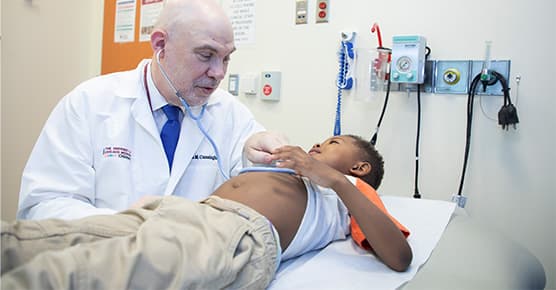Neuroblastoma Diagnostic Services
Physicians at the University of Chicago Medicine Comer Children's Hospital specialize in diagnosing and treating neuroblastoma in babies, children, teenagers — and even adults. Our team sees patients with all types of neuroblastoma, including very aggressive forms. We work with patients and their families to ensure an accurate diagnosis and create an individualized plan for treating the tumor.
Diagnostic Tools
Accurate diagnosis is an important first step for treating neuroblastoma. In addition, determining whether the disease is low-, intermediate- or high-risk is essential for guiding treatment decisions. Our physicians will complete a thorough physical exam and may use some or all of the following tools to confirm or rule out the presence of a tumor:
- Blood and urine tests, to check for the presence of certain proteins associated with neuroblastoma
- Computed tomography (CT), a non-invasive imaging procedure that uses X-rays to evaluate the primary tumor size and whether the tumor has spread
- Magnetic resonance imaging (MRI), a tool that uses magnetic fields and computers to evaluate the location of the tumor
- MIBG scan, to evaluate whether the tumor has spread to the bone and/or bone marrow
- Bone marrow biopsy and aspirate, to determine if the tumor has spread to the bone marrow
- Surgery, to examine the tumor under a microscope and to perform additional tests on the tumor tissue
Pathologists at Comer Children's and the the Children's Oncology Group Reference Laboratory analyze tissue samples to look for certain genetic and biological factors, such as the presence or absence of specific chromosomal abnormalities. The results from these detailed pathology studies provide important details about the unique nature of each child's disease and are used in planning treatment.



